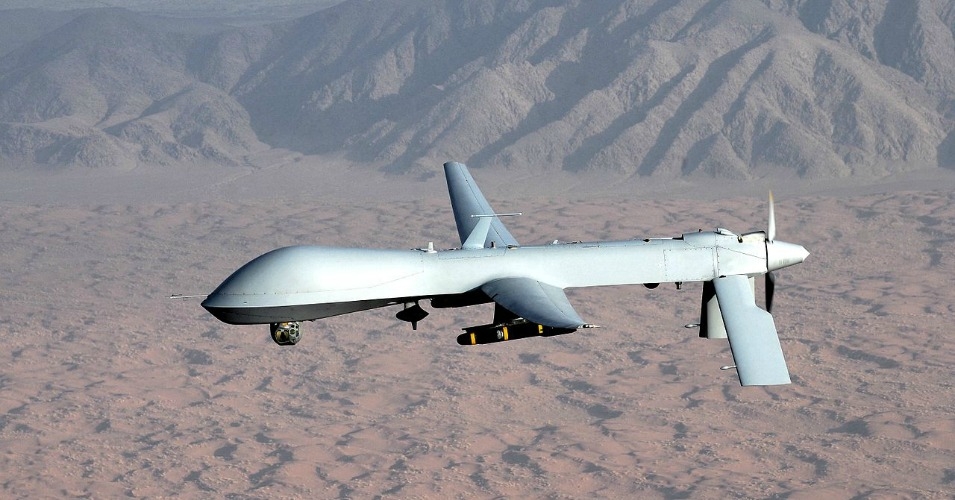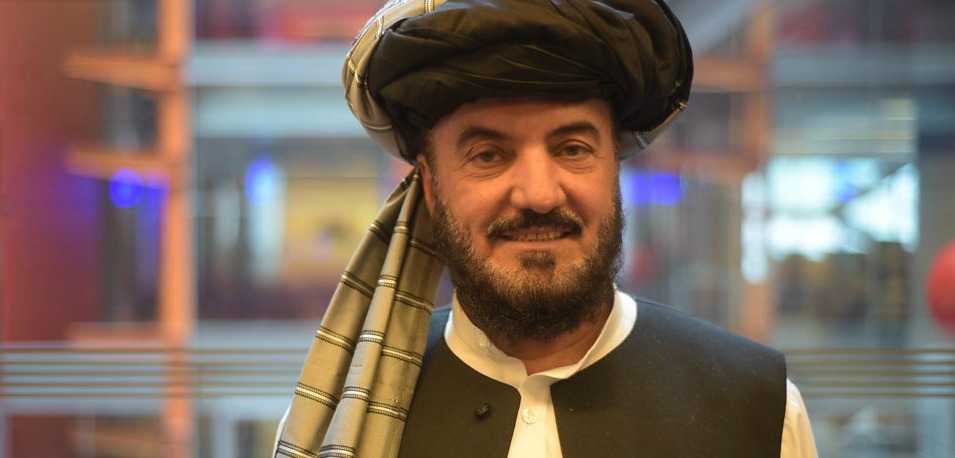“Singling out people to assassinate, and killing nine of our innocent children for each person they target, is a crime of unspeakable proportions.”
By Andrea Germanos, staff writer for Common Dreams. Published 4-13-2016.

An MQ-1 Predator drone. (U.S. Air Force photo/Lt Col Leslie Pratt)
“Stop trying to kill me.”
That’s the message a man from Waziristan, Pakistan’s border area with Afghanistan, has brought to the UK this week, saying that the U.S. has targeted him for death by placing him on the so-called kill list.
In an op-ed published Tuesday at the Independent, tribal elder Malik Jalal explains he’s in England “because I decided that if Westerners wanted to kill me without bothering to come to speak with me first, perhaps I should come to speak to them instead. I’ll tell my story so that you can judge for yourselves whether I am the kind of person you want to be murdered.”
He was invited by Ken MacDonald, former Director of Public Prosecutions, to speak to British parliamentarians this week. As for a U.S. visit, Jalal told BBC, “I don’t trust America and I won’t go there. I came to Britain because I feel like Britain is like a younger brother to America. I’m telling Britain that America doesn’t listen to us, so you tell them not to kill Waziristanis.”
Jalal says he works for the North Waziristan Peace Committee (NWPC), and it’s because of the group’s success towards negotiating peace in the area that the U.S. has targeted him, he told BBC.
“I had a peaceful role in Pakistan. I’m not involved in terrorism,” he said, countering the U.S. assessment of the NWPC as a group that provides safe haven for Taliban. But negotiating with the group is fundamental, he writes, and points to British negotiations with the Irish Republican Army (IRA). “There has hardly ever been a time when terrorists have been brought back into the fold of society without negotiation. Remember the IRA; once they tried to blow up your prime minister, and now they are in parliament. It is always better to talk than to kill.”

Malik Jala, who “puts a very human face on the horror” of the U.S. drone war, according to Clive Stafford Smith of Reprieve. (Inage: screengrab from BBC)
Jalal describes four instances in which he believes he was target of a drone strike, each of which he says killed innocent civilians. His suspicion of being on the kill list was confirmed by local security sources, he writes, which “leaves me in no doubt that I am one of the hunted.”
“I don’t want to end up a ‘Bugsplat’—the ugly word that is used for what remains of a human being after being blown up by a Hellfire missile fired from a Predator drone. More importantly, I don’t want my family to become victims, or even to live with the droning engines overhead, knowing that at any moment they could be vaporized,” Jalal writes.
His assessment of U.S. drone war echoes that made by others of its victims: that it terrorizes communities; kills those not even targeted for death, including women and children; and is counterproductive.
“I know the Americans think me an opponent of their drone wars. They are right; I am. Singling out people to assassinate, and killing nine of our innocent children for each person they target, is a crime of unspeakable proportions. Their policy is as foolish as it is criminal, as it radicalizes the very people we are trying to calm down,” he writes.
“All I want is for the West to stop trying to kill me, my family and my colleagues with the North Waziristan Peace Committee. They have tried to kill me four times, and my children are terrified. This Kill List is just making things far worse in my homeland,” Jalal added in [a] statement released by human rights organization Reprieve, which is representing him.
Reprieve describes the U.S. drone war as “the death penalty without trial,” and has worked with some of its victims to achieve justice.
Clive Stafford Smith, director of the organization, said, “Malik Jalal puts a very human face on the horror of this policy,” and urged British Prime Minister David Cameron to “order a full and transparent inquiry into the Kill List.”
The Bureau of Investigative Journalism estimates that CIA drones strikes in Pakistan may have killed nearly 4,000 people since 2004, including roughly 200 children. And just 10 of the at least 60 people killed by 13 such strikes in 2015 have been identified, the Bureau reported.
But as author Tom Engelhardt wrote last year, “In the twenty-first-century world of drone warfare, one question with two aspects reigns supreme: Who counts? In Washington, the answers are the same: We don’t count and they don’t count.” He wrote:
If you are an innocent American or Western civilian and a drone takes you out, you count. If you are an innocent Pakistani, Afghan, or Yemeni, you don’t. You didn’t count before the drone killed you and you don’t count as a corpse either. For you, no one apologizes, no one pays your relatives compensation for your unjust death, no one even acknowledges that you existed. This is modern American drone reality and the question of who counts and whom, if anyone, to count is part of the contested legacy of Washington’s never-ending war on terror.

